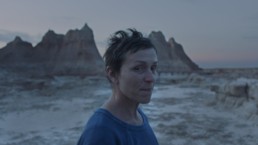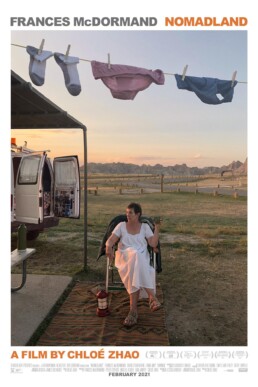‘Nomadland’ Review: A Fresh Look at the Evasive American Dream
A raw look at the van dwellers who choose–and are forced to–live outside of society
It takes a truly magical film to transcend its onscreen presence and hibernate inside your soul. That may sound lofty but since I first saw Nomadland, I haven’t stopped reflecting on its gorgeous interpretation of alternative Americana living. Not only have I reveled in the beauty of the vast desert plains and saturated sunsets, but I’m finding myself meditating on the film’s larger rhetorical question: what does it mean to feel “whole”?
Nomadland is no accidental knockout. With technical skill, a creative vision, and collaboration with some of the most respected artists in the game, director Chloé Zhao’s third feature film is a love letter to nature’s restorative energy and to the pioneers who brave their own trails
Set against a backdrop of economic hardship and an unsteady future, Fern (Frances McDormand) perseveres. She is a prideful woman who-despite losing her husband and more recently, her house and steady employment–accepts no handouts or sympathy. Seasonal gigs and living out of her camper van (named Vanguard) support a minimalist, albeit lonely, lifestyle. She quickly becomes intrigued by a community gathering of like-minded people and it’s not long until Fern integrates herself into their tribe, which kick-starts her exploration into living among nature and discovering her holistic identity.
Compared to her new friends Linda May, Swankie, and Bob Wells (who are, in fact, real-life nomads) Fern is a “beginner nomad.” She quickly adapts to life on the road as a single, middle-aged woman, constantly saying hello and goodbye to the strangers and friends she sees on her open-ended journey around the American West.
Throughout her time on the road, Fern gains independence from self and from society. Her life is atypical from most, a criticism echoed by her suburban-dwelling brother-in-law, but at this point in Fern’s life, the stagnation of daily routines isn’t her priority. Becoming more and more reflective and honest about what she wants out of life, Fern begins to find her peace. Her peace doesn’t look like the pre-packaged “American Dream” that we’ve all been told to strive for, but it’s aspirational nonetheless. A life of new experiences, a smorgasbord of interactions with various characters, and the opportunity to chart her own path offer simplicity and contentedness that a traditional life never could.
The character of Fern could only be brought to life by Frances McDormand, whose natural charm and undeniable talent are channeled in a steadily sentimental manner. Director Chloé Zhao and McDormand bring out the best in each other, creating something so pure like a perfectly in-tune duet. Visually, Nomadland is breathtaking. The poster alone gives a perfect peek into the film’s peaceful warmness; you can almost feel the desert breeze sweeping across your face. Accompanying this rich aesthetic is the piano-centric score from composer Ludovico Einaudi, whose emotionally charged composition adds another element of nostalgia.
Nomadland humbly feels larger-than-life, observing man and nature in symbiotic harmony. It encourages us to look inward and examine where we can be more fulfilled, remembering to waste no time because life is short.
What makes you happy? Great. Now, do that thing.
Morgan Rojas
Certified fresh. For disclosure purposes, Morgan currently runs PR at PRETTYBIRD and Ventureland.


